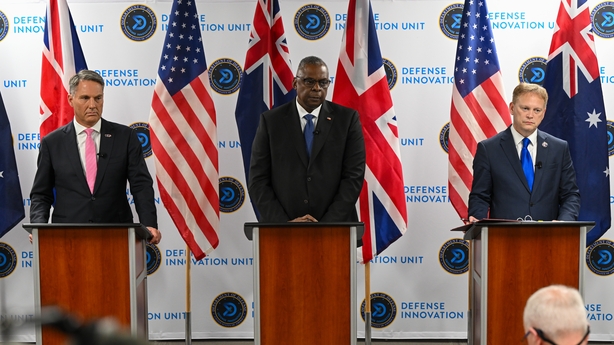South Korea has held talks on joining a part of the AUKUS defence deal between the US, Britain and Australia, Defence Minister Shin Won-sik said, only weeks after the pact said it would hold formal talks on Japan's entry.
AUKUS, formed by the three countries in 2021, is part of efforts to push back against China's growing power in the Asia Pacific region.
"During today's meeting we also discussed the possibility of partnering with AUKUS Pillar Two," Mr Shin said at a news conference following a meeting between Australia and South Korea's foreign and defence ministers.
"We support AUKUS Pillar Two activities and we do welcome that members are considering Korea as an AUKUS Pillar Two partner."
The first stage, or "pillar", of AUKUS is designed to deliver nuclear-powered attack submarines to Australia and is not open to new members.
However, the original three members have long said more countries would be invited to join the second pillar, which is focused on sharing military technology across a range of areas including quantum computing and hypersonic missiles.
Talks about potential joint projects with Japan are set to begin this year.

US to reduce licensing burden for UK, Australia
Meanwhile, the US State Department has unveiled its proposal to reduce licensing requirements for transferring military equipment and sensitive technology to Australia and Britain as part of the AUKUS defence project.
The sharing of closely guarded technology is governed by strict US International Trafficking in Arms Regulations (ITAR).
Under the rule change proposed by the US Department of State, the Department's Directorate of Defense Trade Controls (DDTC) will no longer be required to license or approve defence articles, which will reduce some administrative burdens for companies seeking to make defence products in Australia or the UK.
"This exemption is designed to foster defence trade and cooperation between and among the United States and two of its closest allies," the State Department said in its posting in the Federal Register.
The State Department said the new rule would still generate an "excluded" items list, making approval necessary for articles with national security import.
A list of authorised users would also be generated to ensure that sensitive technologies remained contained.
Jeff Bialos, a former senior Defense Department official now a partner with the Eversheds Sutherland law firm, said the State Department has resisted blanket exemptions for Britain and Australia since they were first proposed by the Pentagon nearly 25 years ago, while he was in office.
The US Commerce Department announced it was scaling back export control requirements for Australia and the United Kingdom to earlier this month.
The Commerce Department only handles licensing of some defence-related items, not the broader range of items covered by the ITAR regime, which is governed by the State Department's Bureau of Political-Military Affairs.
A public comment period on the rule will begin on 1 May and end on 31 May.

